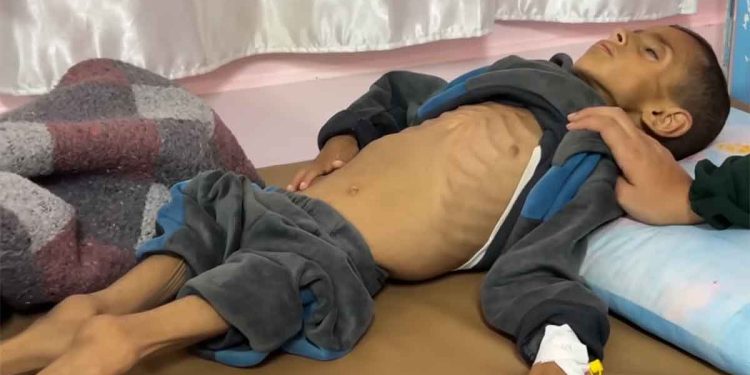The humanitarian crisis in Gaza is intensifying rapidly as Israel’s blockade enters its twelfth week, cutting off essential food and medical supplies to a population of more than 2.4 million people. Hundreds of civilians, primarily children and the elderly, have died from starvation or a lack of critical medical care, while aid trucks remain stranded at closed border crossings.
The United Nations Relief and Works Agency for Palestine Refugees (UNRWA) reiterated that only the sustained and unhindered entry of humanitarian aid can prevent a total collapse of the humanitarian situation. UNRWA stated that the population in Gaza can no longer afford to wait.
According to the agency, a minimum of 500 to 600 aid trucks per day, under United Nations supervision, is needed to meet the basic needs of the population. However, these supplies have not been permitted entry due to continued closure of crossings and stringent restrictions on relief operations.
This obstruction has contributed to what rights observers are describing as a deliberate starvation policy targeting the entire civilian population.
On Saturday evening, Gaza’s Civil Defence Directorate confirmed the death of a four-year-old child, Mohammed Mustafa Yassin, due to severe malnutrition. In a recorded statement, Civil Defence spokesperson Mahmoud Basal attributed the child’s death directly to the blockade and the ongoing denial of food and medicine. Holding the child’s body, he said, “Mohammed was not the first child to die of hunger, and tragically, he will not be the last as long as this famine continues.”
Earlier in the day, the Government Media Office in Gaza reported that 58 people have died due to malnutrition, and a further 242 have died from lack of access to food and medicine since the beginning of the blockade, the majority of whom were elderly.
Alongside the humanitarian blockade, military operations continue across the Gaza Strip, with Israeli forces conducting airstrikes and ground incursions in both the north and south. These attacks have targeted civilian infrastructure, food storage facilities, and aid convoys, compounding the humanitarian impact of the siege.
Since 7 October 2023, Gaza has been subjected to an intensive military campaign that has resulted in over 176,000 casualties, including more than 11,000 individuals still unaccounted for. Hundreds of thousands remain forcibly displaced in dire conditions without shelter or access to essential services.
The scope and nature of these actions do not conform to the legal framework of conventional armed conflict. Instead, they indicate a systematic pattern of deliberate civilian targeting intended to subjugate and dispossess, which stands in clear violation of international humanitarian law. The use of collective punishment, destruction of livelihoods, and denial of access to food and medicine constitute serious breaches that may qualify as crimes against humanity or genocide under applicable legal definitions.
As the situation continues to deteriorate, urgent international intervention is required to halt ongoing violations, ensure immediate and unrestricted access for humanitarian aid, and protect the lives of civilians trapped under siege in Gaza.


























